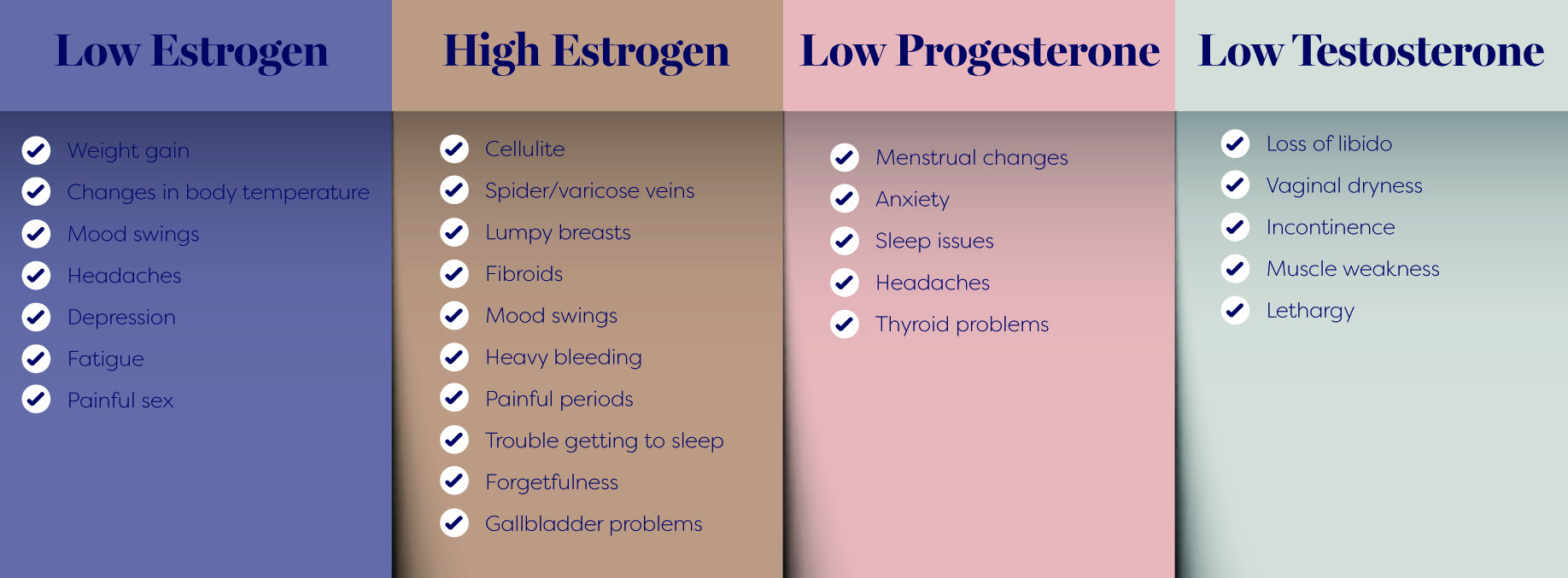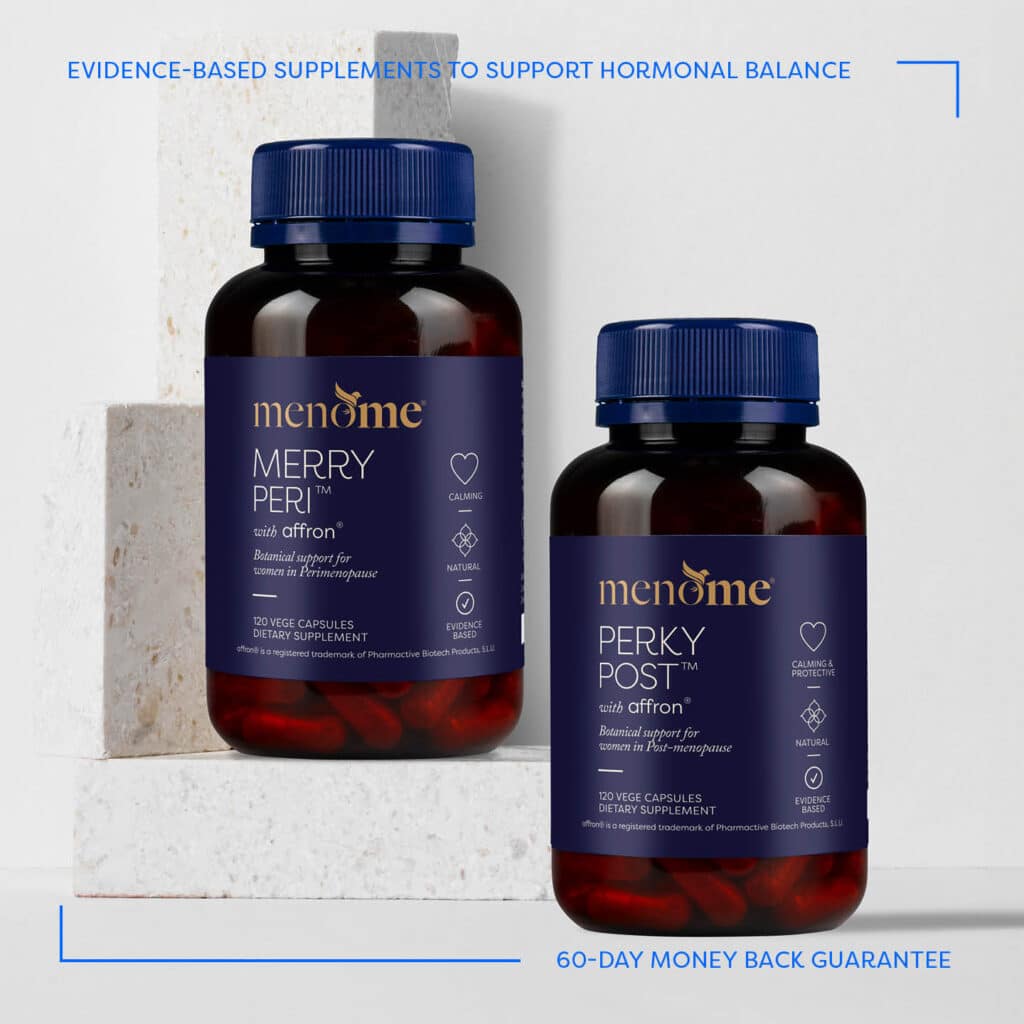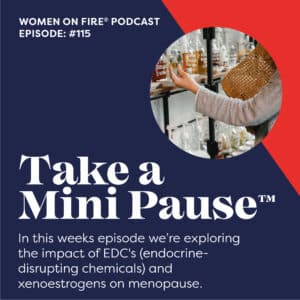Are you feeling irritable, crazy, sluggish, unmotivated, depressed, uptight or chubby? We hear you!
Indeed, if you’ve landed here I’m guessing you’re older than 40. What’s more, I’ll wager that it’s not you but your hormones causing you to feel like this. In fact, perimenopause may have crept up on you. And menopause is not only about estrogen.
What exactly are hormones anyway?
This is such a good question. Especially in view of all the hormone talk around the world at the moment. Many of us nod our heads sagely but do we really understand? Possibly not, so here’s a quick rundown.
We have about 50 different hormones in our bodies. They’re related to such things as reproduction, growth, metabolism and stress.
Hormones are chemical messengers secreted by the tissues into bodily fluids. And these fluids transport them to different cells and organs in the body. Once they reach their destination they act like an instructor influencing growth and behaviour.
For example, adrenaline/cortisol sends a message to the brain to tell the heart to beat faster when it thinks we’re in danger..
Menopause Is Not Only About Estrogen
The sex hormones
When it comes to our reproductive system and peri and post-menopause most of us immediately think of estrogen. It’s our most well known sex hormone and it’s often associated with the overall subject of menopause.
But if we know a little bit more about our sex/reproductive hormones then we might add progesterone to the mix. Because estrogen and progesterone work hand in hand when it comes to our reproductive cycle.
And if we’re very clued up we might include testosterone, which most people think is a guy thing. However, women produce testosterone too. In fact, it’s super-important to us.
Each one of these hormones is an influential contributor to the signs of perimenopause and beyond. Symptoms such as sleep disturbance, changes in body temperature and mood swings BUT they’re not the only players.
6 menopausal hormones
The menopausal years from perimenopause through to post-menopause involve a cascade of hormones and they’re all interconnected. The aforementioned estrogen, progesterone and testosterone (sex hormones) work together with cortisol (the stress hormone), insulin (the fat storage hormone) and the thyroid (the metabolism hormone).
When you understand this, the penny might drop as to what’s behind your irritability, mood swings, meno rage, sex drive, vaginal changes and weight gain.
Here’s a brief overview of how they work:
1. Estrogen
Estrogen is our main female sex hormone and regulates our reproductive system (along with many other processes). It tells it when to produce an egg during menstruation and instructs our body to give us a womanly shape. In fact, we have estrogen receptors all over our bodies and it’s important to our brain, skin, nervous system and so much more. However, as we go into perimenopause our ovarian estrogen levels decrease dramatically and – all too often – erratically which can affect hormonal balance. At around 50 the ovaries stop producing estrogen and the adrenal glands and body fat take over but in greatly diminished quantities. And as estrogen gives us our ‘juice’ and keeps our skin plump, our vagina moist and elastic, and our joints supple we can begin to notice changes.
2. Progesterone
Oh, we love progesterone! Often called nature’s valium progesterone keeps us nice and relaxed, promotes sleep and helps with bone and muscle health. It’s also responsible for maintaining pregnancy and is essential to our fertile years. But our progesterone levels begin diminishing around 35 when our egg reserve starts to fall. And this is one reason for period changes and it happens long before our ovarian estrogen declines. Further, falling progesterone is believed to be a main contributor to the sometimes unpleasant, often inconvenient, effects we may experience as we hit perimenopause. While progesterone levels have lessened, our estrogen may be fluctuating wildly sending hormonal balance into disarray. So as well as diminished estrogen there can be times when we experience high estrogen or estrogen dominance.
3. Testosterone
We produce tesosterone/androgens in our ovaries and adrenals reaching peak levels in our 20s. In fact, women can have more testosterone than estrogen! Testosterone instructs our body to produce pubic hair, helps with reproduction and is related to our sex drive and muscle tone. As with estrogen and progesterone, our testosterone levels begin to decline as we grow older and have halved by the time we’re in our 40s.

4. Cortisol
Cortisol is known as the stress hormone because it’s released by the adrenals – small glands that sit on top of our kidneys – when our brain perceives we’re in danger. And this can cause issues in modern life because the brain doesn’t understand that being stuck in traffic or fighting with our hubby isn’t life threatening. So it hunkers down and acts as if a tiger is chasing us when we’re uptight. As a result many of us are in a constant stage of high cortisol. Quite apart from it not being an ideal state to be in, high cortisol can lead to carbohydrate and sugar cravings, belly fat, impacts our thyroid (metabolism) and affects the production of progesterone. With that said, we need cortisol, it’s what gets us up and going in the morning, but it should decline by evening and not be in constant overdrive mode.
5. Thyroid
The thyroid is in charge of our metabolism. And a healthy thyroid is crucial in many ways but it can often get out of kilter during the meno years. Indeed, if we get elevated cortisol (as above) it puts our body into survival mode and encourages our thyroid to turn down our metabolism to save energy for the future. Further, progesterone helps support our thyroid so diminished progesterone can also affect the thyroid’s efficacy. As a result, fatigue, weight gain, cold hands and feet, hair loss and depression can occur.
6. Insulin
Insulin is produced in the pancreas – a small bean shaped gland – and its job is to keep our blood sugar stable and store any excess fuel as fat. And if we’re eating a highly refined diet, lots of sugar or are stressed (cortisol produces blood sugar), the pancreas pumps insulin out to help stabilise and reduce the blood sugar surges these things can cause. Over time, often in midlife, this leads to insulin resistance, which is rampant in the world today and contributes to obesity and pre-diabetes. Furthermore, it occurs because if it’s served up a continual diet of refined foods the pancreas becomes weaker and can’t put out enough insulin. Sugar then pools in the blood draining energy, inhibiting mood, bringing on brain fog and being a major contributor to weight gain.
Oh, and by the way, when our cortisol is released because the body perceives we’re in danger it dumps glucose (sugar) into our bloodstream.
Every. Body. Is. Different.
It’s a complicated hormonal dance and something we can only touch on here to give you broad guidelines and descriptions. As you know we’re all different. Some people are more sensitive to some aspects of physiology than others. This is why it can be useful to look at your genetics and see how your mother and grandmother fared during their meno years.
5 Ways To Help Your Hormones

1. First and foremost get your cortisol under control by:
- Relax regularly
- Sleep is vital
- Practise mindfulness
- Yoga and Pilates are wonderful choices in midlife for exercise and stress control
2. Balance your blood sugar
- Eat whole foods
- Forget calories and think of food as your medicine
- Avoid refined carbohydrates like breads, pizza, chips, and pasta (try cauliflower pizza)
- Ditch sugar
- Add lots of leafy green vegetables to your diet
- Opt for lean protein
- Take a tablespoon of fresh, ground flaxseeds per day. It’s rich in omega 3’s (only accessible when freshly ground) which may help with joint pain, vaginal dryness and body temperature.
3. Exercise
- How much and what kind is vital
- You can do too much and set off your cortisol
- Walk more
- Strength training is brilliant for bone density
- If cardio’s your thing don’t overdo it
- Interval training (HIIT) has been shown to be beneficial for midlife women

4. Add appropriate supplementation
- Always ensure you use good quality supplements that don’t contain fillers
- Take Merry Peri® or Perky Post® to support you during perimenopause and post-menopause
- A B-complex is a good addition to your daily supplements because it can boost serotonin, ward off depression and help with insomnia
5. Lifestyle
- Use natural skin care and cleaning products (chemicals and pesticides contain endocrine disrupting substances)
- Limit alcohol and caffeine (at least until you get back into balance)
- Ditch smoking and drugs
I hope this overview gives you more of an understanding of what’s going on in your body so you can go forth and conquer!
Disclaimer: this is not an in-depth article on hormones and is intended as a guide only. If you feel you need more help and advice please see a qualified functional medicine practitioner.











